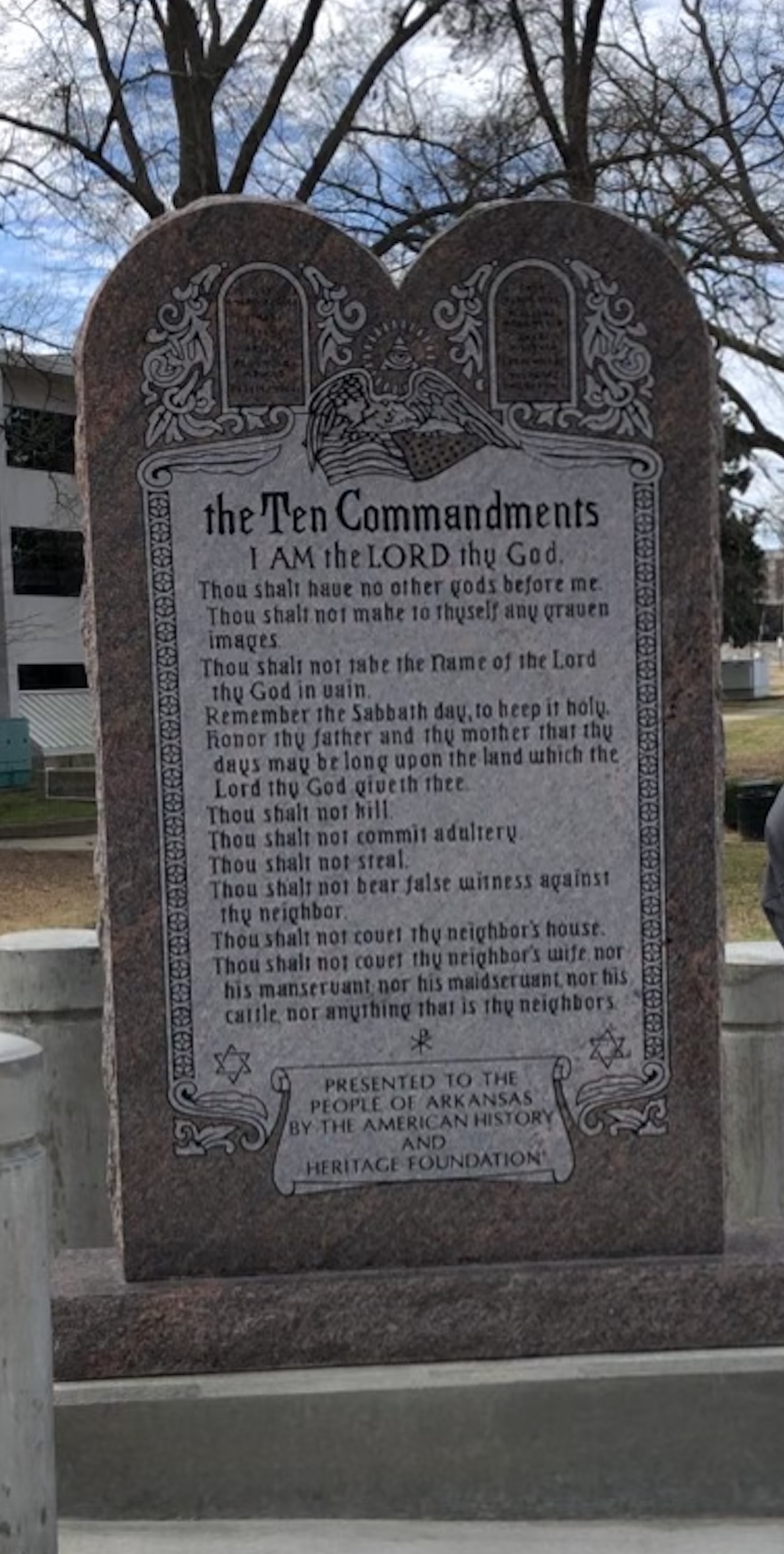
The Freedom From Religion Foundation is among a bevy of plaintiffs asking a federal court for summary judgment to remove a Ten Commandments monument displayed on the Arkansas Capitol grounds.
When the Arkansas General Assembly passed Act 1231 of 2015, it created a cascading legal controversy caused by a quintessentially religious subject — the Ten Commandments. FFRF filed a lawsuit in 2018, within one month of the installation of a massive Ten Commandments exhibit on the Arkansas State Capitol grounds. The lawsuit, which was filed in the U.S. District Court for the Eastern District of Arkansas, seeks a declaration that the monument is unconstitutional and an injunction directing the state to remove the monument. Despite widespread objections, the state went forward with the installation of the monument, which has brought nothing but religious division.
The Ten Commandments are undeniably religious in nature, FFRF’s brief notes. The public presentation of the monument also shows the understanding that the monument was religious in nature. A monument containing the wording prescribed by the General Assembly was proposed by the American History & Heritage Foundation, a dummy organization created by former State Sen. Jason Rapert, the primary sponsor of the Ten Commandments bill. Rapert is also the founder and president of the National Association of Christian Lawmakers.
The Ten Commandments display at the Arkansas Capitol should be immediately taken down for a number of reasons, FFRF and the other plaintiffs argue.
Historically, the Establishment Clause has unconditionally prohibited legislative action that elevates one religion or sectarian belief to favored status. Cognizant of the centuries of persecution resulting from government entanglement with orthodoxy in the Old World, the Framers sought to build a nation founded on the principle that civil government and religious authorities must operate in separate spheres. The Framers’ vision was meant to safeguard religious freedom for all, for, they reasoned, religions will grow organically if free from governmental influence and interference, allowing all to practice religion, or not, according to the dictates of their conscience. The use of our secular government for the advancement of one religion’s beliefs above all others is, to put it plainly, un-American.
Second, a law meant to promote the Ten Commandments’ religious message is an archetypical violation of the First Amendment’s Establishment Clause. It is undeniable that the Establishment Clause was designed to prohibit the government from wielding its authority to take sides in matters of religious belief. But that is precisely what the Arkansas General Assembly sought to do with the enactment of Act 1231.
Finally, the religious divisiveness caused by Act 1231 is precisely the type of harm the Establishment Clause was meant to prevent. Arkansas’s decision to pass Act 1231 in order to erect a stand-alone monument commemorating the Ten Commandments lacks the historical pedigree needed to justify the display in the face of the Establishment Clause’s clear command that the government “make no law respecting an establishment of religion.” It is, in fact, a textbook example of what the Supreme Court has long observed: “Nothing does a better job of roiling society” than “when the government weighs in on one side of religious debate.”
These are among the cogent reasons why FFRF and the others contend that the U.S. District Court for the Eastern District of Arkansas should grant the plaintiffs’ motion for summary judgment and issue an injunction directing the state of Arkansas to quickly remove this monument from the state Capitol grounds.
“From an historical perspective, the Constitution’s Establishment Clause has always embodied the principle of strict separation between government and religion precisely to ensure that government remain solely concerned with secular matters and not intrude into the religious sphere,” the brief concludes. “The Arkansas General Assembly failed to live up to this foundational constitutional imperative when it chose to take sides on a quintessentially religious matter, by ratifying the Ten Commandments in a stand-alone monument. The First Commandment alone makes clear why the Ten Commandments monument violates the First Amendment: it is not the business of the State of Arkansas to tell citizens which gods to have, how many gods to have, or whether to have any gods at all. Act 1231 was, quite literally, a ‘law respecting an establishment of religion.’ That law cannot be allowed to stand.”
The plaintiffs are a diverse lot. Anne Orsi—longtime member of FFRF—is an agnostic atheist who objects to the Ten Commandments monument at issue in this case. Eugene Levy is a rabbi. Gale Stewart is an ordained elder in the Presbyterian Church, U.S.A.. Teresa Gryder is a Wiccan. All of them have the necessity and occasion to visit the Capitol grounds regularly, and come into contact with the biblical monolith. The plaintiffs also include FFRF, the American Humanist Association and the Arkansas Society of Freethinkers.
FFRF Associate Counsel Sam Grover crafted the brief on behalf of the Freedom From Religion Foundation, with Attorney Jerry Schultz of Baker Schulze & Murphy serving as local counsel.
The Freedom From Religion Foundation is a state/church watchdog organization with 40,000 members nationwide, including hundreds of members in Arkansas.

